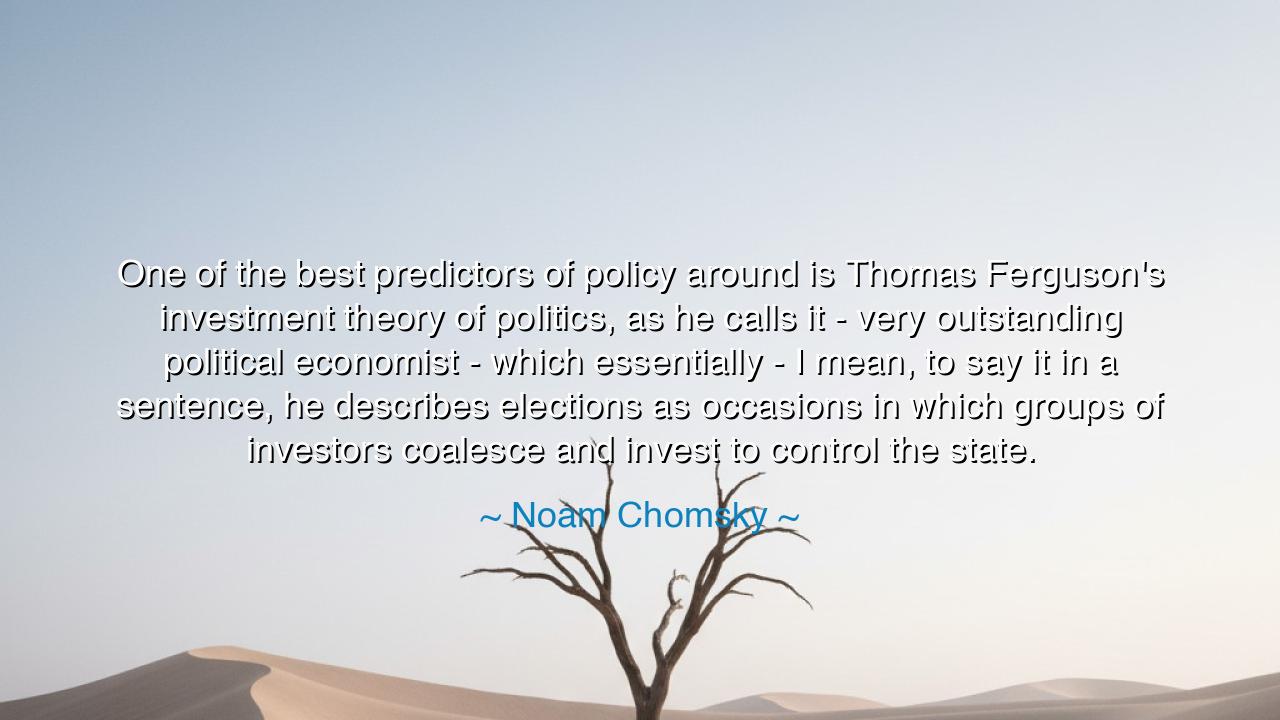
One of the best predictors of policy around is Thomas Ferguson's
One of the best predictors of policy around is Thomas Ferguson's investment theory of politics, as he calls it - very outstanding political economist - which essentially - I mean, to say it in a sentence, he describes elections as occasions in which groups of investors coalesce and invest to control the state.






Hear, O seekers of wisdom, the words of Noam Chomsky, sage and critic of power, who declared: “One of the best predictors of policy around is Thomas Ferguson’s investment theory of politics, as he calls it—very outstanding political economist—which essentially—I mean, to say it in a sentence, he describes elections as occasions in which groups of investors coalesce and invest to control the state.” In these words lies a revelation of the hidden machinery of power: that beneath the banners and ballots, money flows like a secret river, guiding the course of nations.
For Thomas Ferguson’s investment theory of politics teaches us this: elections are not merely gatherings of citizens in free choice, but battles in which the wealthy stake their gold to shape the destiny of the state. Investors, whether corporations or great lords of industry, come together not out of charity but to secure their interests. Their wealth buys influence, their influence bends policy, and the will of the people is too often drowned beneath the clamor of coins.
Consider the Gilded Age of America in the late nineteenth century. Then, vast fortunes rose from steel, oil, and railroads. Men like Rockefeller, Carnegie, and J.P. Morgan poured their wealth into controlling politics. Presidents and senators were chosen not by the humble farmer or factory worker, but by the invisible hand of financiers who purchased loyalty with gold. Policies were written to favor the mighty, while the poor labored in misery. Here is Ferguson’s theory made flesh: elections as investments, states as instruments of wealth.
Yet Chomsky’s recounting is not mere despair, but a call to awareness. To understand the truth of politics is the first step in resisting its corruption. When citizens believe elections to be only the voice of the people, they are blind. When they see that power is brokered like merchandise, they may rise to demand transparency, fairness, and reform. For though investors may command wealth, the multitude commands numbers, and history has shown that numbers, when awakened, can overturn empires.
Therefore, let this lesson endure: policy often follows the path of money, not the voice of the people. But knowledge of this fact is itself a weapon. To know that elections are bought is to seek ways to make them free. To understand the hidden game is to resist it. Chomsky’s words, echoing Ferguson’s wisdom, remind us that democracy must be defended not only at the ballot box, but in the ceaseless struggle against the tyranny of wealth.






NNNhi Nguyen
Chomsky's perspective on Ferguson’s investment theory of politics offers a sobering look at how power works in modern democracies. It’s hard to ignore the role money plays in shaping elections and policy, but does that mean we should lose hope in democracy altogether? Or can we find ways to mitigate the influence of wealthy investors? It makes me wonder if there are reforms that could allow for a more genuine representation of the public’s interests, free from the control of financial elites.
TNThao Nguyen
This concept from Ferguson, highlighted by Chomsky, paints a bleak picture of our political system. The idea that elections are driven by investments made to control the state rather than by genuine public interest raises troubling questions. Are the policies we see today a reflection of the will of the people, or are they a result of financial interests manipulating the system for their own gain? What can we do to shift the balance of power toward the people instead of the investors?
LHLan Hoang
Chomsky’s take on Ferguson’s theory really challenges our perception of democratic processes. If elections are controlled by investors, then who really holds power in a democracy? Is this why so many of our policies seem to benefit the wealthy while neglecting the needs of ordinary people? How do we reconcile the idea of democracy with the reality of corporate influence? Can true democracy exist in a world where money holds so much sway over politics?
THLe Tien Hop
I find it interesting how Chomsky brings Ferguson’s theory to the forefront. If elections are just opportunities for investors to control the state, does that mean real democracy is an illusion? In that case, how do we break free from this cycle? Are there ways for the average person to exert influence in a system that’s seemingly dominated by financial interests? It’s a sobering thought, but maybe acknowledging it is the first step toward real change.
NTDung Nguyen Thi
Noam Chomsky’s reference to Thomas Ferguson’s investment theory of politics really makes you think about the power dynamics in elections. The idea that elections are essentially about groups of investors coming together to control the state is both unsettling and eye-opening. Are we, as voters, truly making decisions, or are we just pawns in a game controlled by a few powerful investors? How can we shift this system to prioritize the interests of the people rather than the wealthy few?